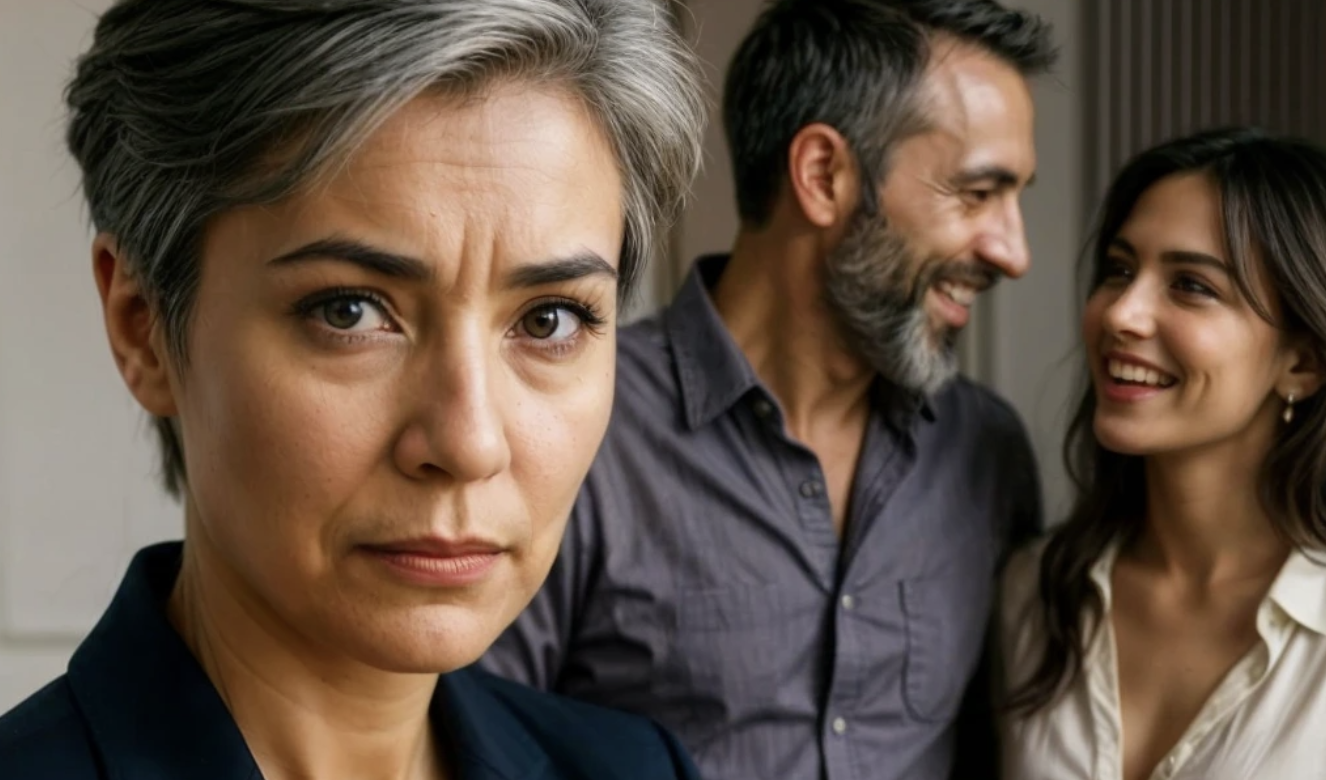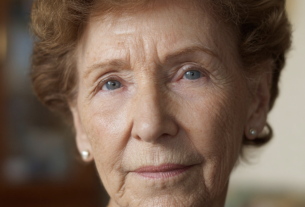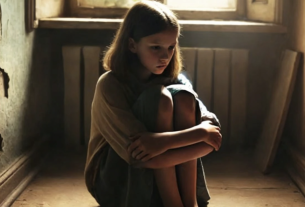The clink of crystal shattered the silence of the kitchen. Marina slowly lowered her hands into the sink, feeling the shards of the glass—gifted on their twentieth wedding anniversary—pierce the pads of her fingers.
“Are you ready to go?” Her voice sounded unusually even, as if it belonged to someone else.
Vladimir stood frozen in the doorway with his travel bag.
His massive figure, which had always seemed to Marina a reliable rock, now looked ridiculous—like a bear suddenly trapped in a china shop.
“Marin, why are you doing this? I explained…” He shifted from foot to foot, unsure whether to come in or leave.
“Explained what exactly?” She turned, wiping her hands on her apron. “That you’re bored? That thirty years is too long for one woman? Or that twenty-five-year-old Anya manages your… midlife crisis better?”
Silence hung between them, dense like fog over a river.
“I didn’t plan it, it just happened,” his eyes darted around the room, catching familiar objects: the clock they bought together in Prague, photos of the children, the vase Marina always hated but kept in plain sight because it was a gift from his mother.
“It just happened?” Marina suddenly laughed, a laugh that chilled Vladimir to the bone. “You packed your things for two weeks. I found receipts from the jewelry store. Saw you hiding your phone. And you say — ‘it just happened’?”
Vladimir shifted nervously. How many times had he rehearsed this conversation? Ten? Twenty? But now all his prepared lines had evaporated.
“I’m fifty-seven, Vova. Where am I supposed to go now?” Her voice trembled for the first time in the entire conversation.
“You’ll manage,” he finally dared to look her in the eyes. “You’ve always been stronger than me.”
“Did I ask about that?”
“Thirty years, Volodya. Exactly thirty years today since we got married.”
He nodded, swallowing the lump in his throat.
“Marin, I…”
“Go,” she turned away. “Just go. Anya is waiting.”
The door closed with a quiet click. Marina slowly sank onto a stool and finally allowed herself to cry. Tears rolled down her face, leaving salty trails on her lips. How long did she sit like that— a minute or an hour? Time dissolved into the emptiness that filled the apartment.
The phone vibrated on the table. “Mom, how are you? Dad called…” Her daughter. Smart Katya, so much like her father with her stubborn gaze and dimples on her cheeks.
Marina put down the phone without answering. What could she say? “Your father left for a girl younger than you?” “I’m alone at fifty-seven?” “I’m scared, daughter?”
The first weeks turned into an endless series of sleepless nights, tears, and deafening silence. Marina wandered the apartment like a ghost, stumbling over traces of thirty years of shared life. Here was his mug with a cracked handle — throw it away? Keep it? Smash it against the wall in a rage? His razor in the bathroom, his slippers by the bed, his sweater smelling of that familiar cologne.
“Mom, you’re barely eating,” Katya came every weekend, filling the fridge with food that would later spoil. “Maybe we should see a doctor?”
“To pump me full of chemicals?” Marina waved it off. “I’ll survive somehow. Not the first, not the last.”
But deep down, she didn’t know — would she survive? At night, Marina lay clutching her pillow and asked herself the same question: When? When did I stop being desirable to him? When did he start looking past me? Why didn’t I notice sooner?
“You’re completely buried here, Marin,” neighbor Nina Petrovna caught her at the entrance. “Come with us to the club at the library on Saturday! They have such interesting lectures and decent people.”
“What club?” Marina brushed her off. “At my age, clubs are for young people.”
“Oh, really,” Nina Petrovna shook her head. “I’m five years older than you! And I’m doing fine! And after my second husband’s divorce, do you know what it was like? And now I met Arkady Semyonych there, can you imagine?”
Marina couldn’t imagine ever wanting another man by her side.
But one morning she looked in the mirror and didn’t recognize the woman reflected back. A dull gaze, gray skin, wrinkles deeper than before. Was that really her? Was this all that was left of her?
“Enough,” she said aloud. “Enough, Marina Sergeyevna.”
An hour later she was sitting in the hairdresser’s chair.
“What shall we do?” asked the young girl with bright pink hair.
“Everything,” Marina answered unexpectedly for herself. “Change me completely.”
When Katya came home in the evening with bags of groceries, she froze in the doorway:
“Mom?! Your hair…”
Marina ran her hand over the short strands with a trendy ash shade.
“Do you like it?”
“Very much!” her daughter smiled broadly. “You look… younger.”
“And I feel different,” Marina admitted. “You know, I was thinking… maybe we should update the apartment a bit? I always wanted light walls instead of these old wallpapers.”
Katya hugged her mother, and for the first time in weeks, Marina felt warmth spread inside.
She started small — enrolled in computer literacy courses at the very club the neighbor had mentioned. Then came the renovation: light walls, new furniture, getting rid of decades of clutter.
“Marina, you’re positively glowing today!” the computer course instructor Oleg Petrovich noticed. “Something good happened?”
“I finally sorted out the attic,” she laughed. “Can you imagine? I found drawings from twenty years ago. I used to be quite good at drawing.”
“So why not start again?” he suggested. “We even have a painting studio.”
And Marina started. At first uncertainly, then with growing pleasure. Her watercolors — bright, somewhat naive — unexpectedly pleased the organizers of a local exhibition.
“You should have seen his face,” she told her daughter after the opening. “That Oleg Petrovich looked at my work like he’d seen Van Gogh!”
“Mom, does he… you know… like you?” Katya asked cautiously.
“What?” Marina laughed. “No, of course not! He just likes my watercolors.”
But in the evening, lying in bed, she caught herself thinking: would that be so bad?
Marina struggled balancing the grocery bags, trying to find her keys in her purse when the phone suddenly rang.
“Yes, Katyush, I remember about tomorrow!” she pressed the phone to her ear. “I’ll bake my signature pies, don’t worry.”
“Mom, there’s something…” her daughter’s voice sounded strange.
“What happened?” Marina finally opened the door.
“Dad called.”
Marina froze on the threshold. Three years. Three years had passed since he closed that door behind him. Three years during which she had received only a couple of dry messages about dividing property through a lawyer.
“And what did he want?” her voice was steady, almost indifferent.
“He asked about you. Said he wants to see you.”
Marina slowly put the bags on the kitchen table. Her gaze swept over the new light blue walls, white cabinets, the ceramic tiles with hand-painted designs she had chosen with such pleasure. Vladimir had never seen this kitchen.
“Mom, are you there?”
“Yes, yes, I was lost in thought,” Marina smiled. “Tell dad I don’t need polite visits.”
“He said…” Katya hesitated. “He said he and Anya broke up. A few months ago.”
Something stirred in Marina’s chest — not pain, long dulled, but rather surprise. This news would have turned her whole life upside down before. Now it only sparked fleeting curiosity.
“So that’s why he remembered I exist?” she began unpacking the groceries. “How sweet of him.”
“Mom, he really sounded strange,” Katya’s voice revealed worry. “Older, I guess.”
“Well, three years is no joke, we all age,” Marina shrugged. “Well, if he wants to talk, let him call. The number hasn’t changed.”
She hung up and walked to the mirror in the hallway. Yes, she had aged too. The wrinkles around her eyes were more noticeable, gray hairs appeared that she didn’t even try to dye. But in her eyes was something that wasn’t there three years ago — calm and, perhaps, wisdom.
The call came in the evening as she curled up in her new rocking chair reading a book.
“Marin?”
His voice. So familiar — and yet so strange.
“Hello, Volodya,” she put the book aside. “Katya said you wanted to talk.”
“Yes, I…” he stumbled. “Can I come over? It’s awkward by phone.”
“Come on,” she glanced at the clock. “Will six tomorrow evening work? I have plans before that.”
Her “plans” were gatherings with new friends from the art studio, which had turned into a weekly tradition. And after them, there was Oleg — no longer just a computer teacher but… who? A friend? A suitor? Marina still felt embarrassed defining their relationship.
“Of course,” disappointment flickered in his voice. Before, he would have said, “I’ll still be at work at six” or “Can’t it be earlier?” And she would have rearranged her plans for him. But not now.
The next day flew by unnoticed. Marina deliberately didn’t prepare for the meeting — didn’t make treats, didn’t fix her hair, didn’t choose a special outfit. She simply wore a comfortable house dress and her favorite cardigan.
Exactly at six, the doorbell rang.
Marina opened and barely recognized the man at the door. Vladimir looked gaunt, his eyes sunken, shoulders stooped. His gray complexion made him look older than his sixty.
“Come in,” she stepped aside.
He stepped into the hallway hesitantly and froze, looking around.
“Everything here…”
“Yes, everything changed,” Marina nodded. “Come to the kitchen, the kettle is already boiling.”
He moved through the apartment like in a museum — carefully, curiously examining the new surroundings, paintings on the walls, trinkets he’d never heard of.
“Are these yours?” he pointed at the watercolors in simple frames.
“Mine,” she put the cups on the table. “I recently exhibited at the city gallery. Sit down?”
He sat down, still amazed.
“It’s very… bright here.”
“Yes, I finally did everything the way I wanted,” she smiled. “So, tell me, how’s your life?”
Vladimir shrugged uncertainly.
“Hard. Anna… well, we split up. She apparently always wanted kids, and I…”
“You already raised yours and didn’t want any more,” Marina finished for him.
“Yes,” he raised his eyes to her. “Marin, I…”
The doorbell interrupted him. Marina glanced at the clock and smiled apologetically.
“Sorry, I’m expecting a guest.”
“A guest?” Vladimir raised his eyebrows, confused. “Maybe I’m coming at a bad time?”
“No, no, it’s fine,” Marina went to the door.
Opening it, she beamed.
“Oleg, come in!” she stepped aside to let the man in.
Into the hallway came a gray-haired, fit man about their age, with expressive brown eyes and a friendly smile. He held a bouquet of wildflowers and a bottle of wine.
“Sorry I’m late,” he handed Marina the bouquet and only then noticed Vladimir. “Oh, didn’t know you had company.”
“Meet,” Marina took the flowers, pressing them momentarily to her face and inhaling the scent. “Oleg is my… friend. And this is Vladimir, my ex-husband.”
The men shook hands. Vladimir felt Oleg’s firm, confident grip and automatically straightened his back.
“Very nice to meet you,” Oleg said with a slight nod. “Marina has told me a lot about you.”
“Really?” Vladimir shot a surprised glance at his ex-wife, who was already placing the flowers in a vase.
“Yes, of course,” Oleg took off his coat. “Thirty years together — that’s a serious chapter in anyone’s life.”
There was no mockery or challenge in his tone — only calm acknowledgment of an obvious fact. Vladimir felt uneasy, like an extra in this new, unfamiliar version of his own home.
“I guess I’ll go,” he stepped toward the door. “You have plans…”
“An evening of poetry at the literary café,” Marina nodded, not the least embarrassed. “So, is it really over between us? Or did you want to discuss something else?”
Vladimir felt the words he had rehearsed the day before stick in his throat. What did he want to say? That he made a mistake? That he realized how precious what they had was? That life with Anya had turned into a nightmare of constant demands and dissatisfaction? That in the empty rented apartment, every night he remembered this home, her scent, her voice?
“I just wanted to know how you are,” he finally managed. “I see you’re well. That… makes me glad.”
“Thank you, Volodya,” her voice had no anger, only calm detachment. “You’ll get better too, I’m sure.”
He nodded, understanding it was neither a question nor an invitation to continue the conversation. Oleg discreetly stepped aside, pretending to examine the watercolors on the wall, but Vladimir felt his presence in every fiber of his being.
“You’ve changed,” he said suddenly, to his own surprise.
“Everyone changes, Volodya,” she shrugged. “Life doesn’t stop, even when it feels like the world has collapsed.”
He wanted to say more but realized there were no words left. Nodding farewell, Vladimir stepped out and slowly walked toward the elevator. Fragments of thoughts flickered through his mind: her new hairstyle, light walls instead of dark wallpaper, watercolors signed “MS” in the corner, a strange man with a bouquet of her favorite wildflowers — how did he know which flowers she liked?
And here he was, having lived with her for thirty years, never bothering to remember.
From the slightly open apartment door came Marina’s laughter — clear, ringing, so familiar and now so unattainable. Vladimir felt something tighten inside. What was he searching for by coming back? Forgiveness? Consolation? Proof that she had suffered without him just as he began to suffer without her?
But he found only one simple truth: life goes on. For everyone. Even when it feels like time should stop and wait for you to tire yourself out and return to your usual place.
Leaving the entrance, he looked up at the windows of their — no, now only her — fifth-floor apartment. The lights shone in every room, making the windows look like warm rectangles of hope in the cold dusk of an autumn evening.
In these windows now lived another life — bright, full of new colors, new impressions, and perhaps new happiness. A life where there was no place for him anymore.
Vladimir slowly walked to the bus stop, feeling tears welling up for the first time in a long while. Not from pity for himself, but from understanding: sometimes what we consider rightfully ours slips through our fingers because of our own blindness. And no apology can restore the shattered mirror of the past.
The woman he left three years ago remained only in his memories. And coming toward him from the doors of the literary café was already a different Marina — with a brush in her hand and a light in her eyes that, to his shame, he never managed to ignite during their thirty years together.



